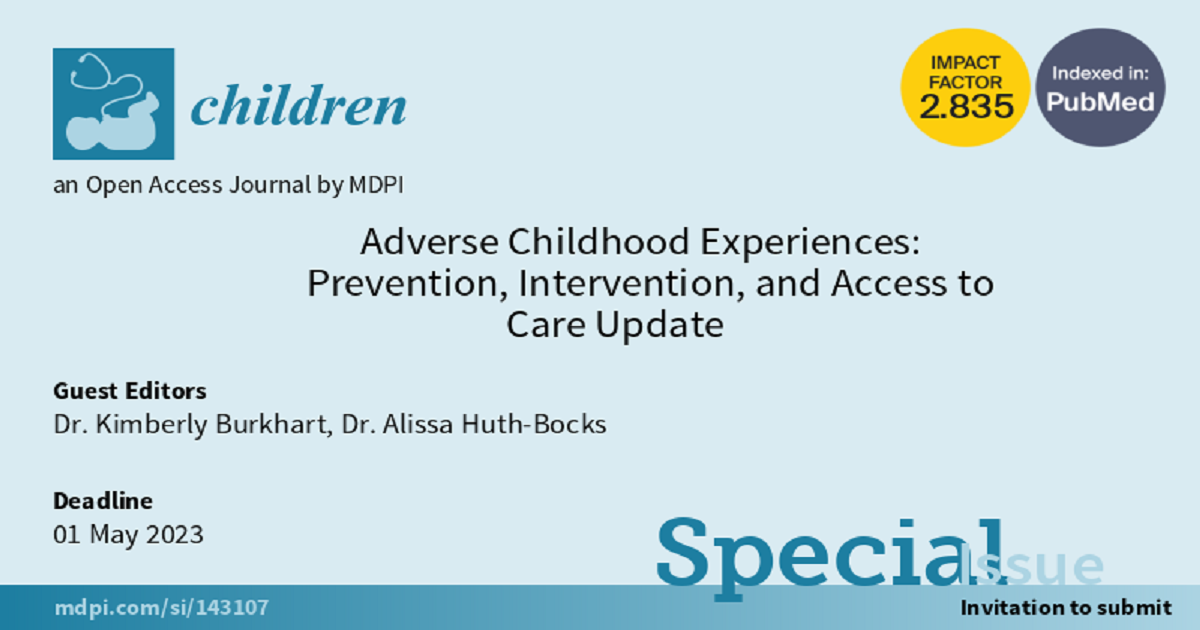Adverse Childhood Experiences: Prevention, Intervention, and Access to Care Update
A special issue of Children (ISSN 2227-9067). This special issue belongs to the section "Global Pediatric Health".
Deadline for manuscript submissions: closed (1 May 2023) | Viewed by 7155

Special Issue Editors
Interests: clinical child psychology; pediatric psychology; autism spectrum disorder; integrated pediatric primary care; collaborative care; child maltreatment; social determinants of health; emergency preparedness and response
Special Issues, Collections and Topics in MDPI journals
Interests: adverse childhood experiences; intimate partner violence; child maltreatment infant and early childhood mental health; parenting; trauma; violence prevention and intervention; poverty
Special Issues, Collections and Topics in MDPI journals
Special Issue Information
Dear Colleagues,
Exposure to adverse childhood experiences has been recognized as a public health crisis in the United States by leading organizations such as the American Academy of Pediatrics (AAP), the National Child Traumatic Stress Network (NCTSN), and the Substance Abuse and Mental Health Services Administration (SAMHSA). Early exposure to stress and trauma have both short- and long-term physical and mental health outcomes across the lifespan. Healthcare settings are increasingly recognized as key venues to identify, intervene, and ameliorate the impact of adverse childhood experiences and build resilience among at-risk youth and their families.
Considering the success and popularity of the Special Issue entitled “Adverse Childhood Experiences: Prevention, Intervention, and Access to Care”, previously published in the journal Children (https://www.mdpi.com/journal/children/special_issues/adverse_childhood_experiences_prevention_intervention_care), we are now releasing a second issue with the aim to gather original research papers and review articles related to adverse childhood experiences. The goal of this Special Issue of Children is to highlight the impact adverse childhood experiences has on social–emotional functioning and access to medical and behavioral health services, and the effect empirically supported prevention and intervention strategies can have on mitigating the negative impact of adverse childhood experiences and in building resiliency. We invite manuscripts focused on children from birth through to the age of 21 and their families. We welcome reviews and original research focused on the impact of adverse childhood experiences and prevention and intervention strategies for both neurotypical and neurodivergent youth.
Dr. Kimberly Burkhart
Dr. Alissa Huth-Bocks
Guest Editors
Manuscript Submission Information
Manuscripts should be submitted online at www.mdpi.com by registering and logging in to this website. Once you are registered, click here to go to the submission form. Manuscripts can be submitted until the deadline. All submissions that pass pre-check are peer-reviewed. Accepted papers will be published continuously in the journal (as soon as accepted) and will be listed together on the special issue website. Research articles, review articles as well as short communications are invited. For planned papers, a title and short abstract (about 100 words) can be sent to the Editorial Office for announcement on this website.
Submitted manuscripts should not have been published previously, nor be under consideration for publication elsewhere (except conference proceedings papers). All manuscripts are thoroughly refereed through a single-blind peer-review process. A guide for authors and other relevant information for submission of manuscripts is available on the Instructions for Authors page. Children is an international peer-reviewed open access monthly journal published by MDPI.
Please visit the Instructions for Authors page before submitting a manuscript. The Article Processing Charge (APC) for publication in this open access journal is 2400 CHF (Swiss Francs). Submitted papers should be well formatted and use good English. Authors may use MDPI's English editing service prior to publication or during author revisions.
Keywords
- adverse childhood experiences
- healthcare utilization
- resiliency
- trauma
- prevention
- intervention
- emergency disaster and response
Benefits of Publishing in a Special Issue
- Ease of navigation: Grouping papers by topic helps scholars navigate broad scope journals more efficiently.
- Greater discoverability: Special Issues support the reach and impact of scientific research. Articles in Special Issues are more discoverable and cited more frequently.
- Expansion of research network: Special Issues facilitate connections among authors, fostering scientific collaborations.
- External promotion: Articles in Special Issues are often promoted through the journal's social media, increasing their visibility.
- e-Book format: Special Issues with more than 10 articles can be published as dedicated e-books, ensuring wide and rapid dissemination.
Further information on MDPI's Special Issue polices can be found here.







